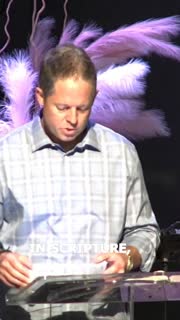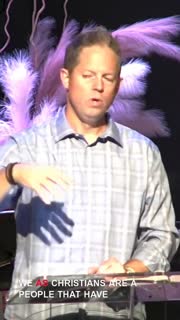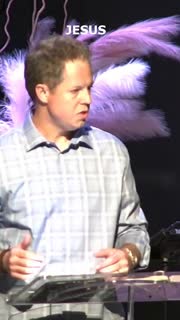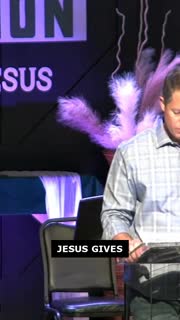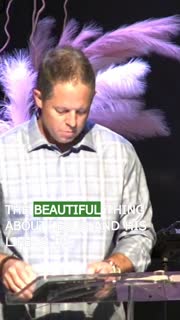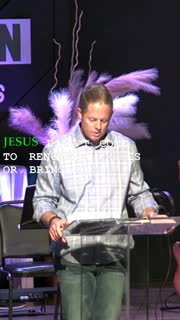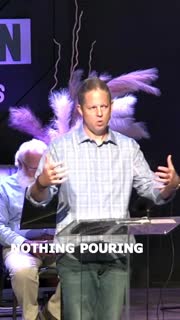Fasting: A Spiritual Discipline for Divine Connection
Devotional
Sermon Summary
Bible Study Guide
Sermon Clips
1) "In scripture, fasting is not a way to get our own will or enact change in society. But fasting is a way to grieve our sin. Fasting is a way to recognize that our dependence, we're going to shift it away from what we think we need, the food that goes in our belly, and then we just have to eat again. Have you ever eaten a meal and you were never hungry again? Now we've all eaten meals where we went, that was three meals, and I'm not going to eat again, perhaps the rest of the day, and then we still eat the next meal. But fasting is a way to grieve over our sin and to recognize our dependence on God." [46:07] (33 seconds)
2) "We as Christians are a people that have a deep, strong heritage, and we are connected to those that came before us. And we can learn an awful lot about godly living by those that have come before us and by emulating some of their behaviors as they were also following Jesus that's why the apostle Paul can be so bold in his statements to say, imitate me as I follow Jesus. He says, follow me as I follow Christ. Now, in our society, we wouldn't hear that very well if I stood up here and said, you guys, be more like Jesus. If you want to be more like Jesus, be like me. We think that guy is arrogant. There's something wrong with him." [48:13] (35 seconds)
3) "Jesus famously fasted for 40 days in the wilderness before he began what we would call his public ministry of calling his disciples and, and performing miracles and healing and teaching in all of the land into the history book of the early church, in the book of acts, chapter 13, in a city called Antioch, the people fasted and prayed. The Christians fasted and prayed. And it was then that God made it clear to them that they were to set aside Paul and Barnabas to go out into the world and to let more people know about Jesus." [48:13] (33 seconds)
4) "Jesus gives this one answer several different ways about celebrating. And the right question is it's all about timing, doing that in the right time, in the right season. Now there is a time to mourn. There's a time to grieve. We're never called to just pretend like life doesn't get hard sometimes because that's disingenuous. And if I do that in my life, people aren't going to trust me. If people don't trust me about that, they're not going to trust me about the things that I say about Jesus. So I want to be really careful about that as well." [01:01:34] (33 seconds)
5) "The beautiful thing about Jesus and his life is in his ministry and his teaching is that it allows us to look back and better understand what was not completely clear to us until Jesus came. Of all the prophecies and the teachings about the promised one, the Messiah, that we can read about in the first, the covenant, what we would call the Old Testament books, we can see those fulfilled in Jesus now, where we live on this side, where we see that the Messiah came, and it was Jesus, and he was died, and he raised again. On the third day, he was physically dead, and then he was physically alive again." [59:03] (36 seconds)
6) "Jesus didn't come to renovate Moses or bring him back, or to even mix law and grace together. He came to bring us new life. As a preacher. One of the benefits that comes with my ordination is that I'm allowed to have an unlimited number of favorite Bible verses. Okay, did you know that as many as I want, I can talk about them all the time. One of my very favorite Bible verses, and it's my favorite because I need the reminder so often, comes out of the gospel of John, chapter seven, verse 38, where Jesus says this, whoever believes in me, as the scriptures have said, out of his heart will flow rivers of living water, my friends." [01:08:17] (43 seconds)
7) "When there's nothing pouring in and there's nothing flowing out. Our lives become stagnant. That's why God has designed us and called us to be together as the church, with these rivers of living water flowing out of us, this new wine that God's giving us, to live a life that is filled with celebration, to live a life that has this joy because that is what he wants for us. And that's way more catchy than grief and sulk. Maybe we go from this place and spread joyous Jesus, everybody that we come in contact with." [01:09:58] (37 seconds)
Ask a question about this sermon
2) "We as Christians are a people that have a deep, strong heritage, and we are connected to those that came before us. And we can learn an awful lot about godly living by those that have come before us and by emulating some of their behaviors as they were also following Jesus that's why the apostle Paul can be so bold in his statements to say, imitate me as I follow Jesus. He says, follow me as I follow Christ. Now, in our society, we wouldn't hear that very well if I stood up here and said, you guys, be more like Jesus. If you want to be more like Jesus, be like me. We think that guy is arrogant. There's something wrong with him." [48:13] (35 seconds)
3) "Jesus famously fasted for 40 days in the wilderness before he began what we would call his public ministry of calling his disciples and, and performing miracles and healing and teaching in all of the land into the history book of the early church, in the book of acts, chapter 13, in a city called Antioch, the people fasted and prayed. The Christians fasted and prayed. And it was then that God made it clear to them that they were to set aside Paul and Barnabas to go out into the world and to let more people know about Jesus." [48:13] (33 seconds)
4) "Jesus gives this one answer several different ways about celebrating. And the right question is it's all about timing, doing that in the right time, in the right season. Now there is a time to mourn. There's a time to grieve. We're never called to just pretend like life doesn't get hard sometimes because that's disingenuous. And if I do that in my life, people aren't going to trust me. If people don't trust me about that, they're not going to trust me about the things that I say about Jesus. So I want to be really careful about that as well." [01:01:34] (33 seconds)
5) "The beautiful thing about Jesus and his life is in his ministry and his teaching is that it allows us to look back and better understand what was not completely clear to us until Jesus came. Of all the prophecies and the teachings about the promised one, the Messiah, that we can read about in the first, the covenant, what we would call the Old Testament books, we can see those fulfilled in Jesus now, where we live on this side, where we see that the Messiah came, and it was Jesus, and he was died, and he raised again. On the third day, he was physically dead, and then he was physically alive again." [59:03] (36 seconds)
6) "Jesus didn't come to renovate Moses or bring him back, or to even mix law and grace together. He came to bring us new life. As a preacher. One of the benefits that comes with my ordination is that I'm allowed to have an unlimited number of favorite Bible verses. Okay, did you know that as many as I want, I can talk about them all the time. One of my very favorite Bible verses, and it's my favorite because I need the reminder so often, comes out of the gospel of John, chapter seven, verse 38, where Jesus says this, whoever believes in me, as the scriptures have said, out of his heart will flow rivers of living water, my friends." [01:08:17] (43 seconds)
7) "When there's nothing pouring in and there's nothing flowing out. Our lives become stagnant. That's why God has designed us and called us to be together as the church, with these rivers of living water flowing out of us, this new wine that God's giving us, to live a life that is filled with celebration, to live a life that has this joy because that is what he wants for us. And that's way more catchy than grief and sulk. Maybe we go from this place and spread joyous Jesus, everybody that we come in contact with." [01:09:58] (37 seconds)
